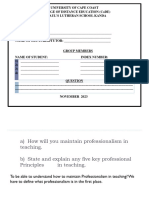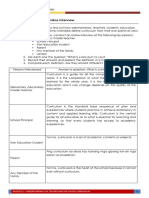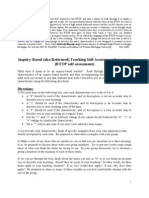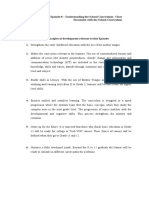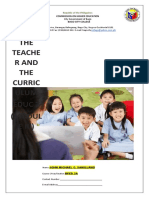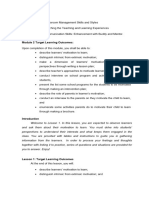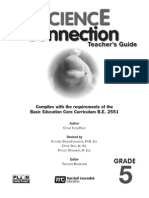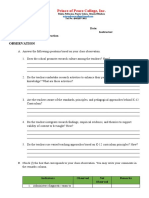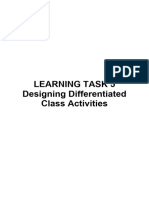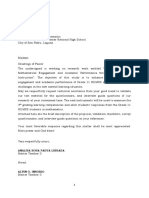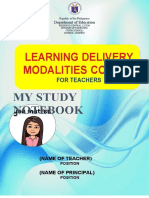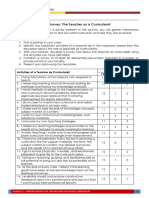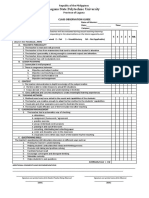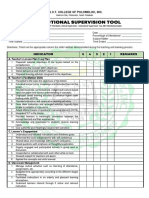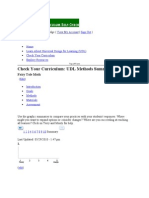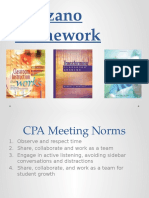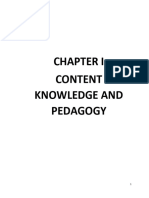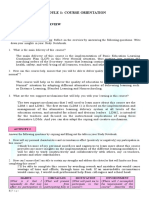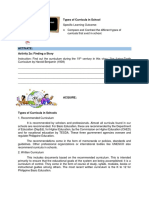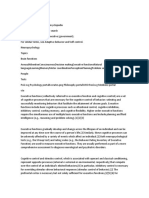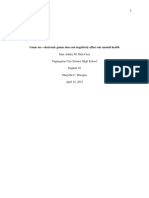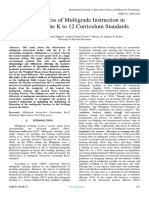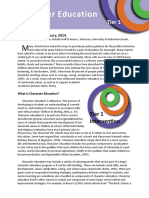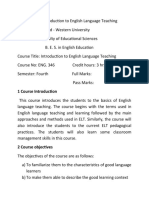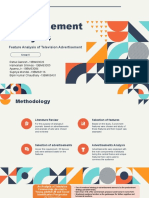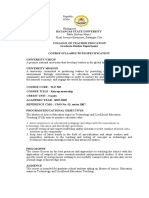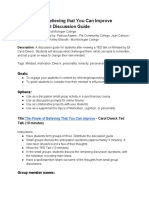MODULE I Lesson 1 Activities
MODULE I Lesson 1 Activities
Uploaded by
malditachickCopyright:
Available Formats
MODULE I Lesson 1 Activities
MODULE I Lesson 1 Activities
Uploaded by
malditachickCopyright
Available Formats
Share this document
Did you find this document useful?
Is this content inappropriate?
Copyright:
Available Formats
MODULE I Lesson 1 Activities
MODULE I Lesson 1 Activities
Uploaded by
malditachickCopyright:
Available Formats
EXPERIENCE: Online Interview
______________________________________________________________________________________________________________________
Direction: In this activity, let us find out how administrators, teachers, students, educators,
community and family members define curriculum from their own points of view.
1. With a classmate, conduct an online interview of the following lay persons:
Elementary Grade teacher
School Principal
Non education student
Parent
Any member of the family
vendor
2. Ask each one the question “What is curriculum to you?
3. Record their answers and present the definition in a matrix form.
4. Compare each definition. Are they similar? Different?
Persons Interviewed Answer to question: What is curriculum to you?
Elementary /Secondary
Grade teacher
School Principal
Non education student
Parent
Any member of the family
vendor
EXCHANGE
______________________________________________________________________________________________________________________
Think-Talk pa more!
Direction:
MODULE 1 – UNDERSTANDING THE TEACHER AND THE SCHOOL CURRICULUM 1
C
1. Choose your online partner through chat in your FB page, group chat or messenger.
2. Think about your definition of curriculum and talk more about it with your partner.
3. Record your conversation and make a narrative report.
4. Take turn and be an active listener.
Your Partner’s Narrative:
Curriculum is a set of offered subjects listed and approved by the Department of Education and/or
Commission on Higher Education. The term specifies a sequence of planned instruction and students'
subjective responses. It has concepts and ideas that needs to be taught to learners. Curriculum may also
equate to an "interactive system of instruction" where students can learn and possess specific outcomes,
strategies, assessment and sources. This may also include the series of activities done outside school premises
that are information-driven.
Your Statement of Appreciation:
EXPAND
_________________________________________________________________________________________________________________
Activity 1. Writing Personal Concepts of Curriculum
Direction: Write your personal concepts about a curriculum.
The term curriculum refers to the lessons and academic knowledge and skills students are expected to learn,
which includes the learning standards or learning objectives they are expected to meet; the units and lessons
that teachers teach; the assignments and projects given to students; the books, materials, videos,
presentations, and readings used in a course; and the tests, assessments, and other methods used to evaluate
student learning. It is the central guide for all educators as to what is essential for teaching and learning, so
that every student has access to rigorous academic experiences.
REFLECTION ACTIVITY
Direction: Express your insights and reflection on the following essential
MODULE 1 – UNDERSTANDING THE TEACHER AND THE SCHOOL CURRICULUM 2
C
questions about a school curriculum.
(A) Is it necessary for teachers to learn about school curriculum? Why?
_______________________________________________________________________________________
_______________________________________________________________________________________
_______________________________________________________________________________________
_______________________________________________________________________________________
_______________________________________________________________________________________
(B) Can a school exist without a curriculum? Why or why not?
_______________________________________________________________________________________
_______________________________________________________________________________________
_______________________________________________________________________________________
_______________________________________________________________________________________
_______________________________________________________________________________________
_______________________________________________________________________________________
(C) How does a strong belief or philosophy influence curriculum?
_______________________________________________________________________________________
_______________________________________________________________________________________
_______________________________________________________________________________________
_______________________________________________________________________________________
_______________________________________________________________________________________
_______________________________________________________________________________________
(D) As future teachers, how important will a curriculum be to you?
_______________________________________________________________________________________
_______________________________________________________________________________________
_______________________________________________________________________________________
_______________________________________________________________________________________
_______________________________________________________________________________________
(E) What are the implications of an ever -changing curriculum to teachers?
_______________________________________________________________________________________
_______________________________________________________________________________________
_______________________________________________________________________________________
_______________________________________________________________________________________
_______________________________________________________________________________________
EXAMINE
_________________________________________________________________________________________________________________________
SELF-CHECK: SPIN A WIN: AGREE OR DISAGREE
Direction: Read carefully each statement and decide whether you Agree or Disagree.
Please check the appropriate column for your decision.
STATEMENT Decision
MODULE 1 – UNDERSTANDING THE TEACHER AND THE SCHOOL CURRICULUM 3
C
Agree Disagree
1. In the Saber Tooth Curriculum, learning is experiential and authentic.
2. It is a reality that there exists more than one curricula in the teacher’s
classroom.
3. A teacher can say with confidence that learning has occurred, if the
curriculum has been assessed.
4. Some curricula in the schools/classrooms are unwritten.
5. To establish national standards, teachers, teachers should be guided by
recommended curriculum in basic and higher education.
6. Teachers should expect that school curricula are dynamic and changing.
7. Evaluated curriculum makes judgment about learning.
8. Textbooks and modules are written curricula that represent the
recommended curricula.
9. Only the Department of Education can recommend a curriculum.
10. In the heart of all the types of curricula, the teacher has a major role.
11. Curriculum is everything that goes on within the school, including extra-
class activities, guidance, and interpersonal relationships.
12. Curriculum is everything that is planned by school personnel only.
13. Curriculum is what is taught inside the school only that is directed by the
teacher.
14. A change in curriculum does not take time and allows shortcuts. It does not
demand a disciplined execution.
15. Curriculum as a discipline has its own principles, theories and practice.
16. In order for change to be positive and result in development,
it must be purposeful, planned and progressive.
17. Curriculum is a series of experiences undergone by learners in
school.
18. Curriculum is static and permanent.
19. Curriculum is a set of performance objectives.
20. Curriculum is a course of study.
MODULE 1 – UNDERSTANDING THE TEACHER AND THE SCHOOL CURRICULUM 4
C
You might also like
- Curriculum Development SystemDocument43 pagesCurriculum Development SystemAbeleneNastorSanManuel100% (1)
- Presentation 002Document11 pagesPresentation 002ENTHRONE VENTURESNo ratings yet
- Personal Concepts of Curriculum ActivityDocument6 pagesPersonal Concepts of Curriculum ActivityJamila AbdulganiNo ratings yet
- The Instructional Cycle: Spark Your InterestDocument50 pagesThe Instructional Cycle: Spark Your InterestAnd'z MirabuenoNo ratings yet
- UntitledDocument15 pagesUntitledRACHEL MAI GARCIANo ratings yet
- 1ST Assignment Prof - Ed 321 (Bayon-On)Document7 pages1ST Assignment Prof - Ed 321 (Bayon-On)JHON DAVE BAYON-ON50% (2)
- RTOP - Self Assessment VersionDocument19 pagesRTOP - Self Assessment VersionfnoscheseNo ratings yet
- The Instruction Al Cycle: 1 EpisodeDocument8 pagesThe Instruction Al Cycle: 1 EpisodeVenna Grace OquindoNo ratings yet
- ELC 101 Learning Episode 10Document11 pagesELC 101 Learning Episode 10norjehanpandapatan17No ratings yet
- Field Study 1 Learning Episode 8 Lesson and ActivityDocument13 pagesField Study 1 Learning Episode 8 Lesson and ActivityCarla Jessica AbeledaNo ratings yet
- Telephone No. (056) 211-0200 Email-AdDocument3 pagesTelephone No. (056) 211-0200 Email-AdEmily Despabiladeras DulpinaNo ratings yet
- Course Material 2 in Prof Ed 7Document10 pagesCourse Material 2 in Prof Ed 7elisha lasolaNo ratings yet
- FS 1 Set 2Document13 pagesFS 1 Set 2Collado, Cristine Joy G.No ratings yet
- Edfs 22 - Episode 7Document4 pagesEdfs 22 - Episode 7RestyNo ratings yet
- Final Examination in MaedDocument3 pagesFinal Examination in MaedMay Anne AlmarioNo ratings yet
- UNIT-1.B UndergradDocument13 pagesUNIT-1.B UndergradNiheiNo ratings yet
- Chapter IV Fs1 1Document43 pagesChapter IV Fs1 1jhellsurbanoNo ratings yet
- Field Study 104Document56 pagesField Study 104Tiff Miranda86% (7)
- Self-Evaluation Script Unit 2Document32 pagesSelf-Evaluation Script Unit 2ahmed.alaaeldineNo ratings yet
- Module III (Teacher As A Curricularist)Document10 pagesModule III (Teacher As A Curricularist)John Michael Catin SamillanoNo ratings yet
- 10Document15 pages10cocofernand12No ratings yet
- FS 100.module 2. Observation in Teaching and Learning Actual School EnvironmentDocument16 pagesFS 100.module 2. Observation in Teaching and Learning Actual School EnvironmentnoimeburtanogNo ratings yet
- Learning Episode 1 Experiencing The Teaching-Learning ProcessDocument44 pagesLearning Episode 1 Experiencing The Teaching-Learning ProcessJohannah AlinorNo ratings yet
- Science EP5Document66 pagesScience EP5Hartley RichNo ratings yet
- Thank You For Your Cooperation!Document11 pagesThank You For Your Cooperation!Atnafu MershaNo ratings yet
- Activity No. 2-Research-Based InstructionDocument3 pagesActivity No. 2-Research-Based InstructionMarjorie HernandezNo ratings yet
- Teacher & CurriculumDocument4 pagesTeacher & CurriculumprintsbyarishaNo ratings yet
- Field Study 104Document54 pagesField Study 104MarkGenesisCabrera100% (3)
- FS 2 Learning Episode 5Document9 pagesFS 2 Learning Episode 5Justine Jerk BadanaNo ratings yet
- Unit 5 Learner Centered Approaches 2 2 2Document18 pagesUnit 5 Learner Centered Approaches 2 2 2Joy Ann AlicerNo ratings yet
- FIELD Study IDocument49 pagesFIELD Study IFriah Mae FernandoNo ratings yet
- Learning Task 5 6Document16 pagesLearning Task 5 6Melvin SumalinogNo ratings yet
- Ped 3 Complete ModuleDocument36 pagesPed 3 Complete ModuleNAld DaquipilNo ratings yet
- Sample ValidationDocument10 pagesSample ValidationJordy Mae BaguinangNo ratings yet
- Lesson Plans in The DepEdDocument6 pagesLesson Plans in The DepEdbetbetmanfalangNo ratings yet
- LDM2 Reflection Paper For MTs or HTs As LAC LEADERDocument8 pagesLDM2 Reflection Paper For MTs or HTs As LAC LEADERRonald Artillero95% (138)
- Study Notebook Complete With Answers For Module 1 5Document41 pagesStudy Notebook Complete With Answers For Module 1 5Cindy May TacboboNo ratings yet
- Study Notebook Complete With Answers For Module 1-5Document41 pagesStudy Notebook Complete With Answers For Module 1-5Maro Mempin-Tabinas100% (1)
- The Teachers As A Curricularist ActivityDocument5 pagesThe Teachers As A Curricularist ActivityJamila AbdulganiNo ratings yet
- Laguna State Polytechnic University: Class Observation GuideDocument1 pageLaguna State Polytechnic University: Class Observation GuideCHRISSALIZZ SANICONo ratings yet
- Instructional Supervision Tool: Indicator 5 4 3 2 1 RemarksDocument2 pagesInstructional Supervision Tool: Indicator 5 4 3 2 1 RemarksLea QuinilogNo ratings yet
- Check Your Curriculum: UDL Methods Summary: Sign OutDocument9 pagesCheck Your Curriculum: UDL Methods Summary: Sign OutStephanie RoutledgeNo ratings yet
- Chapter 1 Lesson 1 Ttsc-2Document6 pagesChapter 1 Lesson 1 Ttsc-2flordeliza cortezNo ratings yet
- Marzano PDDocument34 pagesMarzano PDapi-309968003No ratings yet
- Field Study 1: The Learner'S Development and Environment: General ObjectivesDocument16 pagesField Study 1: The Learner'S Development and Environment: General ObjectivesArnol Candare100% (1)
- Field Study I Module2023 2024Document180 pagesField Study I Module2023 2024adrian savedorNo ratings yet
- MODULE-4-Lesson 1,2 Dr. Sawe, Dr. GonoDocument15 pagesMODULE-4-Lesson 1,2 Dr. Sawe, Dr. GonoCRING TVNo ratings yet
- Learning Outcomes and Learning Experiences For Technically Developed Curriculum Projects in TESL Dr. Azadeh AsgariDocument28 pagesLearning Outcomes and Learning Experiences For Technically Developed Curriculum Projects in TESL Dr. Azadeh AsgariDr. Azadeh AsgariNo ratings yet
- Module 6 Curriculum ImplementationDocument28 pagesModule 6 Curriculum ImplementationDisheila Mae TaparNo ratings yet
- Study Notebook-OstulanoDocument34 pagesStudy Notebook-OstulanoJonathan BulawanNo ratings yet
- Types of Curricula in SchoolDocument4 pagesTypes of Curricula in SchoolJunmar AbaldeNo ratings yet
- FS 1 Quiz 19 36Document10 pagesFS 1 Quiz 19 36Kenneth John M. CaldaNo ratings yet
- Cathyrine B. Caddawen Subject: Curriculum Development and Implementation AssignmentDocument2 pagesCathyrine B. Caddawen Subject: Curriculum Development and Implementation Assignmentjingky SallicopNo ratings yet
- Module 2Document30 pagesModule 2Verena Raga71% (7)
- G7 Q1 Learning MaterialDocument22 pagesG7 Q1 Learning MaterialPrincess Nicole LagbaoNo ratings yet
- IDocument5 pagesIIrene Quimson100% (6)
- Survey QuestionnaireDocument10 pagesSurvey QuestionnaireAndrew Esquierra100% (2)
- Lesson 1 Lesson PlanDocument17 pagesLesson 1 Lesson PlanErika Mae TupagNo ratings yet
- Being a 21st Century Educator: Five Trends You Really Want to KnowFrom EverandBeing a 21st Century Educator: Five Trends You Really Want to KnowRating: 3.5 out of 5 stars3.5/5 (2)
- The Structured Method of Pedagogy: Effective Teaching in the Era of the New Mission for Public Education in the United StatesFrom EverandThe Structured Method of Pedagogy: Effective Teaching in the Era of the New Mission for Public Education in the United StatesNo ratings yet
- Motivation, Job Satisfaction and Job Involement-1Document13 pagesMotivation, Job Satisfaction and Job Involement-1Saifullah WaseemNo ratings yet
- Executive FunctionsDocument6 pagesExecutive FunctionsEri CkNo ratings yet
- Game On-Electronic Games Does Not Negatively Affect Our Mental HealthDocument4 pagesGame On-Electronic Games Does Not Negatively Affect Our Mental HealthSam Ashley Dela CruzNo ratings yet
- Interpersonal Category: The Ten Managerial RolesDocument2 pagesInterpersonal Category: The Ten Managerial RolesShimelis Tesema100% (1)
- Effectiveness of Multigrade Instruction in Lined With The K To 12 Curriculum StandardsDocument7 pagesEffectiveness of Multigrade Instruction in Lined With The K To 12 Curriculum StandardsInternational Journal of Innovative Science and Research TechnologyNo ratings yet
- Project Psychology 3rd SemDocument15 pagesProject Psychology 3rd SemshashishNo ratings yet
- Character Education: Tier 1Document7 pagesCharacter Education: Tier 1PMM IkhbalNo ratings yet
- PDEV-111 Personal Development/Pansariling KaunlaranDocument16 pagesPDEV-111 Personal Development/Pansariling KaunlaranJuneca SumaletNo ratings yet
- Sociological Factors To Drug Abuse and The Effects On Secondary School Students' Academic Performance in Ekiti and Ondo States, NigeriaDocument8 pagesSociological Factors To Drug Abuse and The Effects On Secondary School Students' Academic Performance in Ekiti and Ondo States, NigeriaShokunbiNo ratings yet
- Introduction To English Language Teaching - For MergeDocument310 pagesIntroduction To English Language Teaching - For MergeAmrit BanthaNo ratings yet
- Child Abuse: Lecturer: Nadia ShamasnahDocument16 pagesChild Abuse: Lecturer: Nadia ShamasnahAudios Jamil Al Nees100% (1)
- Foundation of Interpersonal CommunicationDocument17 pagesFoundation of Interpersonal CommunicationSiti FaridahNo ratings yet
- MODULE 8-Neo Behaviorism: Tolman and BanduraDocument3 pagesMODULE 8-Neo Behaviorism: Tolman and BanduraDennis LucasNo ratings yet
- Feature Analysis of Television AdvertisementDocument14 pagesFeature Analysis of Television AdvertisementSaurabh TripathiNo ratings yet
- Facing Your Fears: Exposure: Doubts About The Helpfulness of Exposure?Document5 pagesFacing Your Fears: Exposure: Doubts About The Helpfulness of Exposure?jefrirezaNo ratings yet
- chc30113 Cluster 2 Sak 5Document34 pageschc30113 Cluster 2 Sak 5api-290734105No ratings yet
- Ten Important Characteristics of High-Performance Work TeamsDocument2 pagesTen Important Characteristics of High-Performance Work TeamsEloisa DacanayNo ratings yet
- Sop Saad 3Document2 pagesSop Saad 3ZarmeenaGauharNo ratings yet
- The Psychosocial Adjustment To Illness Scale (Pais) : DerogatisDocument15 pagesThe Psychosocial Adjustment To Illness Scale (Pais) : DerogatisM.Fakhrul KurniaNo ratings yet
- What Is Evidence Based HRDocument3 pagesWhat Is Evidence Based HRsaidur RahmanNo ratings yet
- Perfectionism Information Sheet - 01 - What Is PerfectionismDocument1 pagePerfectionism Information Sheet - 01 - What Is PerfectionismMihaiviorel87No ratings yet
- UTS Week 1Document3 pagesUTS Week 1NikkaNo ratings yet
- He Teaching Psychomotor SkillsDocument10 pagesHe Teaching Psychomotor SkillsImma Concepcion MaglawayNo ratings yet
- The Influence of Using CIRC Method in Improving Students' Reading SkillDocument4 pagesThe Influence of Using CIRC Method in Improving Students' Reading Skillsusan warahuwenaNo ratings yet
- Show Competence in Educational Pedagogy and Adapt With The Innovations in Technology Education and Knowledge GenerationDocument9 pagesShow Competence in Educational Pedagogy and Adapt With The Innovations in Technology Education and Knowledge GenerationElizalde PiolNo ratings yet
- Consumer BehaviourDocument16 pagesConsumer BehaviourRujuta ParabNo ratings yet
- Non-Verbal Comms NotesDocument6 pagesNon-Verbal Comms NotesChitepo Itayi StephenNo ratings yet
- Business Marketing Communications: Managing The Personal Selling FunctionDocument20 pagesBusiness Marketing Communications: Managing The Personal Selling FunctionMaruko ChanNo ratings yet
- Chapter 1 AbpsychDocument6 pagesChapter 1 AbpsychCharlene Juanitez RoqueroNo ratings yet
- Growth Mindset - Student Discussion GuideDocument3 pagesGrowth Mindset - Student Discussion GuideQuynh Ngan TranNo ratings yet

